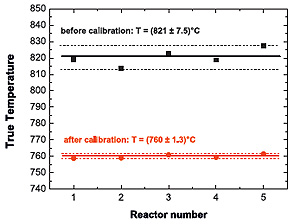LayTec has now developed the ultimate temperature calibration tool for its EpiTT, EpiTwinTT and EpiCurveTT tools: the AbsoluT. The new instrument is designed for on-site use in AIXTRON Planetary and CRIUS reactors. It performs temperature calibration inside the MOCVD chamber through the original viewport without any sophisticated alignment and with unrivaled accuracy.
 Temperature
measurements in 5
identical reactors before
calibration (black)
and after calibration
(red) .
Temperature
measurements in 5
identical reactors before
calibration (black)
and after calibration
(red) .
All reactor-to-reactor and ringto- ring temperature variations caused by manufacturing tolerances of the equipment (viewport and window variations) can now be easily corrected. The new method will replace the less accurate and more time consuming method of eutectic calibration used currently.
A calibration with AbsoluT takes only 30 minutes and shortens maintenance cycles profoundly. The user just has to put the AbsoluT head into the chamber and press it with its heat resistant surface against the reactor lid under the optical view-port. The calibration data is automatically tracked and processed for further temperature measurements. Recently, the new method was successfully approved at industrial customer sites. A customer who tested AbsoluT wrote: "Your new calibration method is very successful. After calibration the temperature measurement in MQW showed identical results in each system. I think your team did a very good job here!"
In the figure we show a typical calibration result. AbsoluT was used in 5 identical CRIUS reactors running the same LED recipe. The initial values (black) were gained with reference to the black body pre-calibration before shipment. They are obviously higher than the real temperature, and head-to-head or reactor-to-reactor variations are in the range of ± 7.5 K.
As the original viewport of the MOCVD system is not available at LayTec for pre-calibration, on-site variations of the viewport diameter (typically in the range of 10 %) cannot be corrected. The viewport aperture, however, affects temperature sensing in CRIUS type of reactors because the intensity of the IR radiation detected by the pyrometer changes if the view-port diameter differs. The new AbsoluT calibration completely eliminates these effects: after temperature calibration (red), the correct temperature of 760°C was measured and the temperature variation of ± 1.3 K was validated by identical photoluminescence (PL) emission wavelength of the wafers from all 5 reactors.
AbsoluT will be available to LayTec customers in April 2010. For further information please contact [email protected].